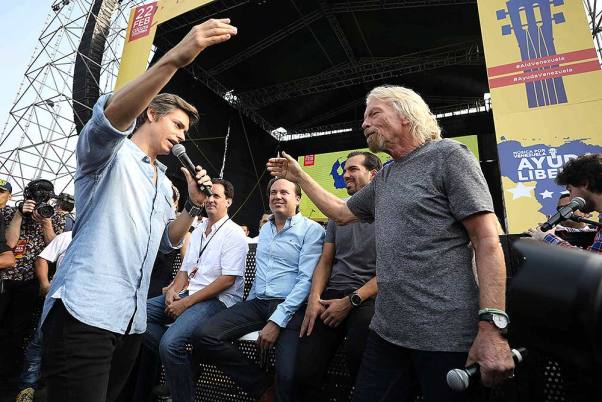
Caracas, Venezuela, Feb 25 -Venezuelan singer Carlos Baute, left, gets ready to embrace Venezuela Aid Live concert organizer Sir Richard Branson, prior to the start of the concert on the Colombian side of the Tienditas International Bridge on the outskirts of Cucuta, Colombia, on the border with Venezuela.
The UN Secretary General Antonio Guterres and the UN Human Rights Commissioner Michelle Bachelet on Sunday sharply criticized the tense situation in Venezuela which is said to be facing an acute shortage of food and basic human necessities. The country has refused to allow food and other aid supplies for its people, reports Manik Mehta from New York.
United Nations, Feb 25 (NNN-BERNAMA) — With rising tensions on the weekend along the borders between Venezuela and Colombia and Brazil, parallel to the clashes between protesters and the authorities within Venezuela, both the United Nations Secretary General Antonio Guterres and the Head of the UN Human Rights’ Office (OHCHR), Michelle Bachelet, voiced shock and dismay Sunday over the escalating tensions, and appealed to all sides to maintain calm.
Guterres emphasized that violence had to be avoided “at any cost, and that lethal force not used in any circumstances”, and urged “all actors (involved) to lower tensions and pursue every effort to prevent further escalation”.
Bachelet bluntly condemned “the excessive use of force used by the Venezuelan security forces, as well the involvement of pro-government elements”, which have resulted in at least four deaths and more than 300 injuries on Friday and Saturday, according to OHCHR.
“People have been shot and killed, others have reportedly received wounds from which they will never completely recover, including losing eyes,” she said. “These are disgraceful scenes. The Venezuelan government must stop its forces from using excessive force against unarmed protesters and ordinary citizens.”
Bachelet referred to reports she had received about the numerous and, in some cases prolonged, violent incidents, at different points of Venezuela’s borders with Colombia and Brazil, as the Venezuelan security forces tried to halt the aid supplies coming into the country through closed border points.
OHCHR also received several reports about the involvement of armed pro-government elements in the violent attacks on protesters; Bachelet urged the Venezuelan Government “to rein in these groups and arrest those among them who have used force against protesters”.
Recalling that the “use of proxy forces has a long and sinister history in the region”, she described it as “very alarming to see them operating openly in this way in Venezuela”, adding that “the Government can, and must, stop them from exacerbating an already highly inflammable situation.”
In his meeting with Venezuelan Foreign Minister Jorge Arreaza last Friday at the UN headquarters in New York, UN chief Guterres had reiterated that the UN acts in accordance with the humanitarian principles of humanity, neutrality, impartiality and independence, working with Venezuelan institutions to assist people in need.
This was the third time that Minister Arreaza met with the UN Secretary-General in a matter of few weeks. The two had discussed the situation in Venezuela and also in the region, with Guterres appealing the Venezuelan authorities to refrain from using lethal force against demonstrators.
In view of Venezuela’s worsening economic and political uncertainty, the UN had been providing local institutions medical kits for women and children; aid teams have also been delivering 100,000 treatments for those suffering severely from malnutrition. Six temporary shelters have been set up in the western border states to house 1,600 people and offer them protection and information, as well as family kits containing food and clothing.
The World Health Organization (WHO) confirmed that it is continuing to work with the authorities through the Pan-American Health Organization (PAHO), notably to prevent and control communicable and non-communicable diseases. Immunization campaigns have been carried out to halt the spread of measles and diphtheria.
In a bid to help 3.6 million Venezuelans, including 2 million children, the UN humanitarian coordination office (OCHA) has appealed for nearly $110 million.
Meanwhile, as the number of refugees and migrants from Venezuela continues to rise – it has already touched 3.4 million this month – UN agencies raised alarm over the humanitarian needs these women, children and men face, and the strain this represents for communities hosting them.
The UN refugee agency (UNHCR) and the UN migration agency (IOM) issued statements based on data from national immigration authorities and other sources, showing that, on average, in 2018, 5,000 people left Venezuela every day in search of protection or a better life. The vast majority of them – 2.7 million – are hosted in countries of Latin America and the Caribbean.
Currently, Colombia hosts the highest number of Venezuelan refugees and migrants, with over 1.1 million. It is followed by Peru, with 506,000, Chile 288,000, Ecuador 221,000, Argentina 130,000, and Brazil 96,000. Mexico and other countries in Central America and the Caribbean are also hosting significant numbers of refugees and migrants from Venezuela.
As the numbers continue to rise, so do the needs of these refugees and migrants, as well as those of the communities hosting them. Governments in the region are leading the response and working to coordinate efforts based on the Quito Declaration for example, adopted in September and which has been an important step towards a regional approach to scale up the assistance and protection of Venezuelan nationals and facilitate their legal, social and economic inclusion.
–NNN-BERNAMA


